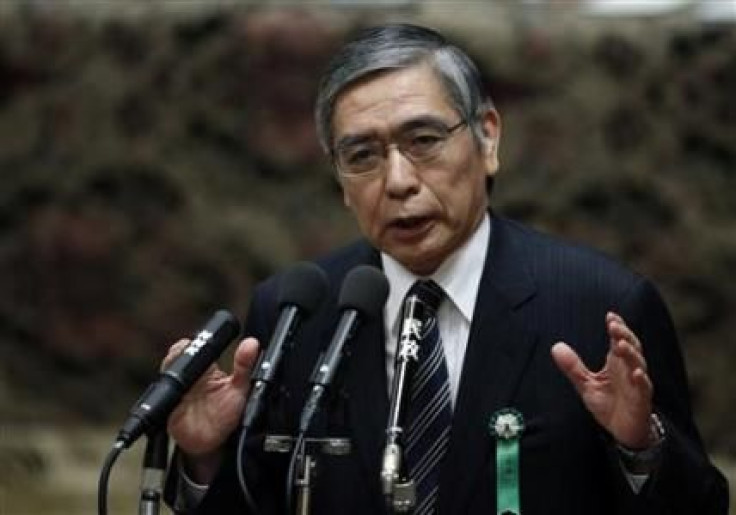BOJ Governor Kuroda Vows Bolder Actions To Defeat Deflation

Haruhiko Kuroda, the Japanese government's nominee to be the next Bank of Japan governor, says he will do whatever he can to pull the economy out of deflation if he assumes the post, signaling more aggressive monetary easing measures.
Kuroda, a well-known advocate of aggressive policy easing, is considered the top contender for the post of Bank of Japan governor that falls vacant after the current head of the central bank, Masaaki Shirakawa, and his two deputy governors, leave their jobs on March 19.
Kuroda, 68, president of the Asian Development Bank, is the nominee of Prime Minister Shinzo Abe. He is likely to be appointed as BOJ governor next week, as he has the backing of the main opposition party as well. The nomination needs to be approved by both lower and upper houses of the parliament. The ruling party controls the lower house while opposition parties have majority in the upper house of the parliament.
The Abe government hopes that Kuroda’s appointment as the new governor could push the central bank toward adopting bolder monetary measures to back the government fiscal stimulus.
Addressing the Japanese parliament, Kuroda said: “I would like to make my stance clear that we will do whatever we can do.”
In line with the expectations that he will be backing the aggressive monetary policy of the Abe government if he is elected, Kuroda said that the BOJ's current policies were not powerful enough to boost inflation to 2 percent, a target he said the central bank should strive to achieve in two years, Reuters reported Monday.
He added that the BOJ should consider launching the open-ended asset purchase program (APP) earlier than the program's scheduled start in 2014.
"It would be natural for the BOJ to buy longer-dated government bonds in huge amounts," Kuroda said in a confirmation hearing in the lower house of Parliament. "But the central bank also needs to scrutinize market developments at the time, as well as the potential drawbacks."
He said that he would not set any limits on the amount of cash the BOJ pumped into the economy.
The prospect of the BOJ buying longer-dated bonds prompted a market rally, led by the longer-end bonds. Yields on 20-year bonds dropped to a seven-month low of 1.55 percent. Yields on 5-year debt hit a record low of 0.11 percent, Reuters reported. Bond yields move in the opposite direction of bond prices.
The Abe government last month announced aggressive fiscal measures to boost the economy and to end a 15-year deflation. The radical measures invited criticism from the G-7 and G-20 countries because Abe's policies led to sharp depreciation of the yen. The domestic currency depreciated to a three-year low while the markets popped to a four-year high after the Abe government announced the aggressive measures.
Admitting that the monetary easing could lead to a currency war among the competing nations, Kuroda said: "There's evidence that currencies tend to fall for countries that ease monetary policy on a large scale. ... But the BOJ's policy is not targeting currencies."
"The important thing is to ensure price stability and achieve the 2 percent price stability goal, although it could affect currencies in that process," he added.
© Copyright IBTimes 2024. All rights reserved.












